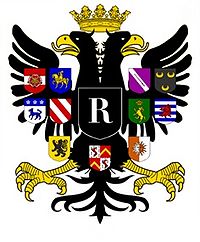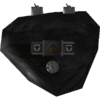Feudal States
| Feudal States OXP | |
|---|---|

| |
| Download Link | Latest (2021) |
| Version | 2.1 |
| History | N/A |
| Stations | Stations |
| Ships | Ships |
| Missions | Elements |
| Equipment | N/A |
| Alternative HUD Available |
None |
| Sound Set Available |
Some Music |
| Category | Systems OXPs |
| Author | Ramirez |
Contents
Overview
The Feudal States is a flavour OXP that adds various new elements to the leading feudal systems in Oolite galaxies. The current version covers Galaxies 1, 2, 3, 5, 6 and (incompletely) 7.
Elements
The OXP contains four basic elements:
Challenges
Pilots can visit Royal Hunting Lodges where they are able to challenge nobles in ship-to-ship contact. Bets can be placed on the outcome, giving you an alternative way of making quick money. Use the F8 interface while docked at the Lodge to accept a challenge and bet on it.
Missions
Good pilots are in high demand amongst the Feudal States. Visit the Royal Court where you can take on missions, ranging from simple deliveries to the capture and ransom of senior nobles. Use the F8 interface for the Royal Court after landing on the planet.
Promotions
As your standing with the Feudal States increases, you can join their ranks as a knight of one of the royal houses. Further success will see you elevated to the peerage, with the chance of becoming one of the leading members of royal society.
Tournaments
The Feudal States hold regular tournaments where nobles gather to test their skills in combat. All pilots with noble rank are eligible to take part, with the winner taking home a major cash prize as well as increasing their prestige.
More detailed information on the OXP is available in the PDF readme (see below).
Lore
The sections immediately beneath are taken from Ramirez's included .pdf:
History
The Feudal States were formed in the decades following the first wave of the galaxy’s human colonisation. While the Corporations and Democracies had great success in securing new territory and resources, many individuals found themselves disenfranchised from power, lacking either the political skill or the business acumen to have a real say in the governing of their own affairs. In many systems, breakaway movements soon sprung up, with miners, engineers and farmers agreeing to pool their resources and seek a better life elsewhere. The risks were great. Much of the galaxy’s unclaimed territory had by this time become a lawless hunting ground for pirates, cruising from system to system preying on unfortunate merchants and passenger liners. With no defence fleet of their own, and little money to pay for mercenary protection, the colonists turned their back on the complex systems of government that had oppressed them, and instead sought to build their strength through the ancient principles of feudalism. The idea was simple: anyone willing to provide military service to the movement would be rewarded with substantial territories in the new systems, with all the wealth and privilege associated with it.
Despite its rather old-fashioned nature, this offer of service was readily accepted by thousands of highly-rated combat pilots, many of whom had also lost out in the galactic land-grab and were having to scrape a living as itinerant freelancers. For them, serving as a knight in one of the Feudal States was an opportunity to further their careers in a more stable environment and finally earn the respect they felt was their due.
Many Feudal States were established in this way, each system forming its own set of houses, ranks, titles and styles based loosely upon those of Old Earth. For several years, the different states supported each other, eager to present a united front to other governments. But as the ranks of knights swelled, the Feudal States became ever more aggressive in character and friendly rivalry often led to war. Unable to challenge the military authority of the more established governments, the Feudal States turned upon each other in a bid to achieve supremacy.
The Feudal Wars, as the conflicts became known, were small, localised affairs and had little impact on the galaxy as a whole, although many dealers in other systems made their fortune by supplying arms and equipment to the belligerent states. Only when fighting spilled over into a nearby Democratic system, resulting in the accidental destruction of a passing freighter convoy, did the Galactic Cooperation act to put an end to the conflict. A ceasefire was enforced, the terms of which included a general embargo on the supply of offensive weapons by members of the Cooperation to any of the Feudal States.
The ceasefire remains in force today, however it is an uneasy truce and hostilities have recently resumed, with the feudal houses mounting frequent raids against each other’s trade convoys and even capturing high-ranking nobles for ransom. So long as any violence is contained within Feudal borders and does not endanger the lives of visitors, GalCop has tended to turn a blind eye to most inter-house conflict and police patrols do not venture far from the main space stations.
Economy
The Feudal States operate a range of economic models from industrial to agricultural, but they are all hampered by a lack of valuable raw resources; the systems with the most potential having been colonised long ago. Some states have managed to exploit indigenous flora and fauna with moderate success, but the majority have turned to tourism to boost their income. Particularly popular are the Royal Hunting Lodges, small stations set away from the main space lanes where knights and nobles gather to test their combat skills and take part in large inter-house tournaments. For those living in societies where conflict is increasingly frowned upon, and the presence of GalCop is never far away, a visit to the Feudal States offers the chance to experience the life of a warrior, living according to the ancient laws of chivalry.
Ships and Equipment
The trade embargo enforced by GalCop has left the Feudal States heavily self-sufficient in terms of equipment. Due to their lack of skill in high-tech engineering, the states favour simple but sturdy ships for military service rather than the more complex, high-maintenance models used by other governments. In recent times, most ships have been provided through a special contract with Beckmann-Fleisig AG, an independent shipbuilder with similar views on function over form.
A significant consequence of the Feudal States’ low-tech approach is that pilots are less reliant on the complex missile and defence systems that have become popular on many ship models. As a result, pilots in feudal service are known to be exceptionally good shots and many hold high combat ratings with the Elite Federation. Typically, each Feudal House operates three basic ship classes: the Jäger, Korvette and Zerstörer.
From Cim's Ship's Manual
Tucked away inside his Ship's Library OXP:
A Feudal System is defined as “a system where the exercise of power is hierarchical in nature”. In practice, since that is virtually tautologous, this status is reserved for those systems which have been unable to come to a satisfactory agreement with the Cooperative over at least one of the terms in the treaties. They may make a few goodwill payments to fund a basic station and patrols, or the Cooperative may provide them from surplus funding elsewhere, but there is no formal agreement.
Atlaeser in Chart 7 actually follows a traditional feudal model in its government, with the Grand Mover ruling with an inner court of Flock Leaders, and an outer court of Path and Skein Leaders (the planet still uses the traditional avian titles of nobility, from pre-spaceflight migrations). The system has relatively high living standards even for the serf classes, thanks to a well-balanced economy, and excellent natural resources.
At the other end of the scale, Sovere in Chart 3 has virtually no natural resources, and even its water is contaminated with hallucinogenic compounds. The corporate government would like to sell the water to other systems, as there is some demand for it, but under Cooperative law it is classified as a Narcotic, and the government's refusal to accept this classification is the crux of the dispute with the Cooperative.
Cetiat in Chart 8 is the sort of system where the Cooperative practice of restricting the supply of technology to Feudal systems makes a lot of sense. The system refuses to sign up to either the non-aggression or mutual defence clauses of the Cooperative treaties, although fortunately its lack of industrial resources means that the nearby systems are not in any great danger from its pitiful navy. The dictatorship's territorial ambitions, while extremely unlikely to get anywhere, are long-standing.
NOTE that cim's account is at loggerheads with that of Ramirez just above it. One presumes that this is motivated by an uneasiness with the concept of popular feudalism so far in the future. As adumbrated in the musings section beneath, with the collapse of the Golden Age due to Thargoid invasions and the rise of piracy, Feudalism is a perfectly reasonable response.
Ships and Stations
 Jäger |
 Korvette |
 Zerstörer |
 Royal Hunting Lodge |
Difficulty
Taking part in missions, challenges and tournaments is entirely optional. Missions and tournament events increase in difficulty as you progress, while challenges vary in difficulty depending on the skill and rank of your opponent.
Requirements
Note that the ship models use shaders to help with identification, though the OXP will run with shader options turned off.
Dependencies
Requires Planetfall OXP (either the 2013 PF1 version or the 2024 PF2 version).
Download
- v.2.1 Downloadable from [here]
- Feudal_States_1.16.3.oxz (downloaded 3870 times) or through the in-game Expansions Manager.
- The Feudal States OXP is available for download at Ramirez' Oolite Pages
- Feudal_States_1.16.2.oxz for Oolite 1.79 or later (downloaded 2835 times).
Musings
G8 is missing from this OXP (there are 32 feudal states there). It would also be nice to add in some more nationalities (Norwegian? Hungarian? Finnish? Brazilian? Scottish? etc). And maybe one or two of the other species - the batrachians of G8 Rear or the felines of G8 Aanra?
The escutcheons for G7 are likewise missing.
Historic context
Feudalism developed in Europe as a response to the downfall of the Roman Empire (≅ GalCop) and the incursions of the barbarians (≅ Thargoids & pirates). As matters in The Eight worsen and presuming that GalCop proves incapable of supporting local regimes, one might well expect more states to take up a feudal system of government as people cry out for protection against the invaders!
Tweaks
OXP's being modifiable, this one, also, can be changed at whim if you have the skills. See the screen shots of DGill's version here, with larger hunting lodges, a feudal HUD (!) and a greater variety of different missions.
Tucked away inside this oxp is one of Ramirez's famous .pdf's stashed full of information (15 pages!).
To extract it, try here: File:The Feudal States.pdf.zip
Or you can use the Expansions Manager, or just expand it with your computer's software unzipper and peek into the folder.
Links
- You can find the Feudal States discussion thread on the Oolite Bulletin Boards here.
- See the Royal Houses box at the bottom of this page
This has proved a very popular OXP - together with the main thread there are many others dealing with problems people found. These two are a little different:
- Land ownership as reward for missions for Feudal lords? (2012)
- How do you imagine Feudal Systems? (2017)